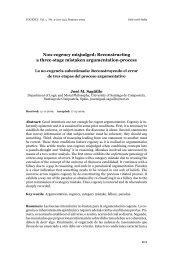Cogency v2 n2
Cogency v2 n2
Cogency v2 n2
Create successful ePaper yourself
Turn your PDF publications into a flip-book with our unique Google optimized e-Paper software.
COGENCY Vol. 2, N0. 2, Spring 2010<br />
expression are either indeterminate or incongruous (e.g., disputants might<br />
disagree about what should count as evidence for the claim). The meaningfulness<br />
of a disagreement is due to the similarities in the use of an expression<br />
(e.g., disputants might agree about the consequences of the acceptability<br />
of the claim). Thus, deep disagreements tend to occur on the fringes of<br />
understanding. Importantly, these are the very features that make deep disagreements<br />
impervious to the normal operations of reasons and evidence.<br />
To illustrate this type of case, consider an example Wittgenstein (LC, pp.<br />
55-56) contemplated during his Lectures on Religious Belief (c. 1938) about a<br />
religious person who believes in Judgement Day and a person who does not.<br />
If you ask me whether or not I believe in a Judgement Day, in the sense<br />
in which religious people have belief in it, I wouldn’t say “No. I don’t<br />
believe there will be such a thing.” It would seem to me utterly crazy to<br />
say this. And then I give an explanation: “I don’t believe in …”, but then<br />
the religious person never believes what I describe. I can’t say. I can’t<br />
contradict that person. In one sense, I understand all he says – the English<br />
words “God”, “separate”, etc. I understand. I could say: “I don’t<br />
believe in this,” and this would be true, meaning I haven’t got these<br />
thoughts or anything that hangs together with them. But not that I could<br />
contradict the thing. You might say “Well, if you can’t contradict him,<br />
that means you don’t understand him. If you did understand him, then<br />
you might [contradict him, or agree with him].” That again is Greek to<br />
me. My normal technique of language leaves me. I don’t know whether<br />
to say they understand one another or not. These controversies look quite<br />
different from any normal controversies. Reasons look entirely different<br />
from normal reasons. They are, in a way, quite inconclusive. The point is<br />
that if there were evidence, this would in fact destroy the business. Anything<br />
that I normally call evidence wouldn’t in the slightest influence me.<br />
While normal controversies might be settled by the evidence, this controversy<br />
would require being persuaded to acknowledge the determination<br />
of a new concept of evidence. Yet, Wittgenstein does not say that such a<br />
disagreement is impervious to the operations of reason; rather he claims<br />
that reasons function differently is such cases.<br />
In Section 6 we consider some cases Wittgenstein offered as illustrations<br />
of the way reasons actually function in the resolution of disagreements<br />
50








